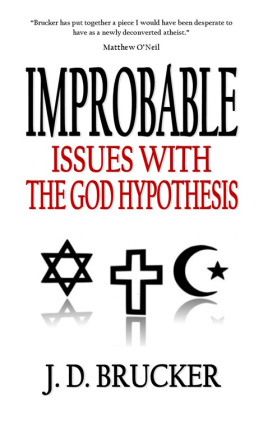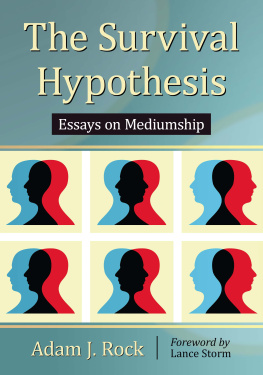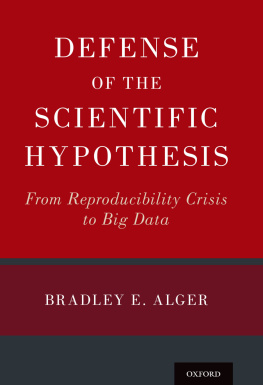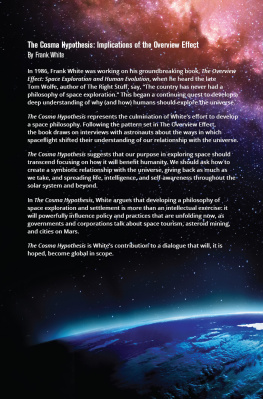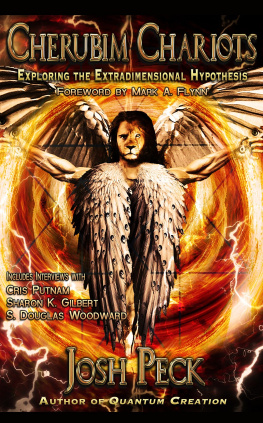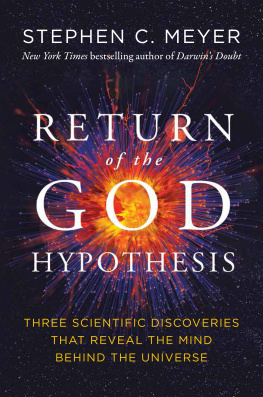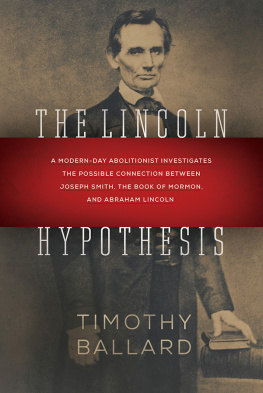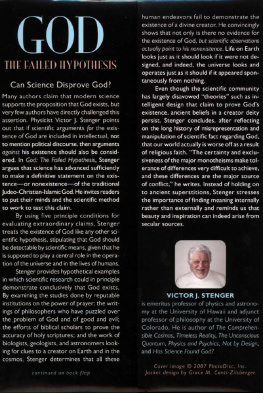IMPROBABLE
Issues with the God Hypothesis
J. D. BRUCKER
Copyright J. D. Brucker 2014
Second Edition (Formerly Improbable: Is There Any Reason To Believe In God?)
All rights reserved. No part of this publication may be re-produced, stored in or introduced into a retrieval system, or transmitted, in any form, or by any means (electronic, mechanical, photocopying, recording or otherwise) without the prior written permission of the publisher.
This book is sold subject to the condition that it shall not, by way of trade or otherwise, be lent, resold, hired out, or otherwise circulated without the publishers prior consent in any form of binding or cover other than that in which it is published and without a similar condition including this condition being imposed on the subsequent purchaser.
ISBN-13: 978-1503105386
ISBN-10: 1503105385
For Camden
Faith means not wanting to know whats true.
Friedrich Nietzsche
Praise
"Brucker is doing something wonderful -- continuing the logical argument debunking the idea of god or the supernatural. It may well be said that on the atheist side of the argument, we are specialized in two factions: logic and morality. While I and several others heatedly discuss the lack of virtue innate in faith, Mr. Brucker has joined the ranks of those who calmly but decisively cut down the incoherence of the idea of god with Occam's deadly Razor and many other tools. Too many facets of this argument require specific and purposeful observation, and Brucker has done a great deal of the work for anyone who chooses to pick it up -- splendidly, I might add."
Joshua Kelly, author of Oh, Your god!: The Evil Idea That Is Religion
Brucker has put together a piece I would have been desperate to have as a newly deconverted atheist. I am more than inclined to agree with Kelly's review, but add that Brucker is more than a Victor Stenger in the making. Brucker tackles more than cosmology - he touches on evolution, theology, and history all in short, concise chapters that are a pleasure to read and easy to follow and digest. I could only imagine Brucker fuming during Hovind or Ken Ham or Ray Comfort sound bites; in return, writing this scathing rebuttal to nonsensical questions about the origin of our solar system, our planet, our species, and even our own race [yes, this question has come up in these debates]. Brucker has well informed arguments that do not fall victim to fallacies appealing to emotion, groupthink, or authority. They are well reasoned with examples and studies, as well as references to thorough studies for further reading. If you are someone new to having lost your faith and want to prepare yourself for the conversations you will face by having understandable facts in hand, this is the book you need to read.
Matthew ONeil, author of You Say That I Am: Jesus and the Messianic Problem
Improbable is a book that seeks to challenge its readers' concepts of religion, faith, and the monotheistic conventions they may have blindly accepted in the past. Thankfully, it does so with class, panache, straight talk, and scientifically based supporting evidence to back up its points. Brucker tackles the toughest concepts that many of us wrestle with in making the decision on how we're going to look at faith going forward in our lives. Discussed are intelligent design (or lack thereof), moral implications, and the alternative explanations for our universe. While Brucker is respectful in his approach and doesn't lambaste the faithful as idiots, he also doesn't skirt the issue or qualify his suppositions. This straightforward style makes the book feel honest. Regardless of your starting point, Brucker's insights are inarguably thought-provoking and worth consideration for both the religious and nonreligious, but would be better swallowed by someone already on the path to non-faith.
Armin Navabi, founder of Atheist Republic and author of Why There Is No God: Simple Responses to 20 Common Arguments for the Existence of God
This book will help young people obtain the verbiage they need when they are confronted by the onslaught of religious people trying to lure them into their cults. It's written intelligently but doesn't force dummies like me to break out the dictionary every 5 minutes. I really appreciate that in an atheist writer.
Joey Lee Kirkman, co-author of Bedtime Bible Stories Explicit!
Contents
I. Note from the Author
II. Preface
III. Maintaining a Realistic Perspective
1. From Neither Dust nor Babel
2. Unintelligent Design
3. God and Human Behavior
4. An Immoral Monster
5. A Godless Universe
6. Historically Speaking
7. Men of Myth
IV. Afterword
V. Acknowledgments
VI. About the Author
VII. Excerpt from God Needs To Go: Why Christian Beliefs Fail
I. Note from the Author
This book serves as a second, revised edition to Improbable: Is There Any Reason To Believe In God? only because the former publishing company allowed me to retain the rights for this book once company ownership switched hands. (Dangerous Little Books is now owned by ReThink Press) So as a result, this book is now a self-published work. Thank you for your support. - J. D. Brucker
II. Preface
This work has found its way into being based solely on the idea that the Abrahamic deity known by the Muslim as Allah, by the Jew as Yahweh, and by the Christian as God is the creator of all living and inanimate matter inside the known universe. Within the boundaries of this text I will present a thesis, one that can offer an answer to the most debated question ever presented: Does the god of Abraham exist? While individuals may tend to shy away from this topic, it should to be a discussion worth having.
A belief in God may seem to be harmless when thinking of your closest friends or relatives who are otherwise awfully wonderful people but it can actually create something much more dangerous toward the progression of humanity. Since most are ignorant of this fact, they often find that arguing against the existence of God is pointless, asking, Why can't you just leave them be and let them believe what they want to believe? Well, I found it important that I answer that question first before venturing into my reasoning behind this improbability.
Religious faith has the ability to turn an ordinarily rational human being into an individual with the motivation to believe foolish things and to commit destruction and mayhem on a massive scale. In order to argue against the methodology behind those adverse religious exploits, what needs to be determined is whether the footing of their religious belief is as credible as they would wish to believe. We, as humans, have an insatiable thirst for truth, yet we often find ourselves on the wrong end of that blurred spectrum.
An intrigue for the metaphysical is something that seems to manifest itself within our subconscious, without warning and sometimes overpoweringly. When faced with a baffling situation, we tend to assign an answer sometimes without taking into consideration that all of the evidence available would, in fact, yield a more sophisticated answer. The idea that something greater than ourselves, which ignorantly bares all the appropriate answers, proves to reign supreme amongst half of the human population on Earth.
Today, most of these individuals believe that a single divine being is responsible for creating every element of this universe that can be observed. However, a deeper examination into their professed doctrine and beliefs will expose an abundance of infantile flaws which reveal that the origin of their chosen theology may have been nothing more than assumptions based on uneducated gatherings by those with little knowledge of the universe we inhabit. In the face of such knowledge, billions still believe that God is the creator of all, and never will there be a differing hypothesis.
Next page
